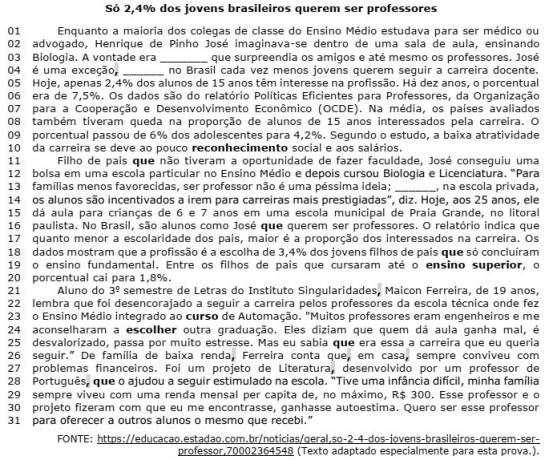The active voice is a verbal voice in the Portuguese language.
The function of verbal voices is to indicate whether the subject practices or receives/suffers the verbal action of a prayer.
When you finish reading this text, you will have understood what active voice is, you will know how to form sentences that exemplify this verbal voice, and you can test your knowledge of the subject by doing exercises in commented feedback.
Get to work!
What is active voice?
The active voice is the verbal voice that indicates that the subject of the prayer practices a certain action.
Example:
The teacher reproved Cristiano.
When we analyze the sentence, we see that:
- The teacher: subject who practices the action of the sentence
- Failed: verb in active voice; the action performed by the subject: reproving Cristiano.
See some more active voice example sentences:
- I bought the car.
- The director developed the software.
- We will remodel the restaurant.
- The teacher scolded Roberto.

In addition to the active voice, there are two more verbal voices in the Portuguese language: a passive voice and the reflective voice.
Difference between active voice, passive voice and reflective voice
The main difference between reflective voice, active voice and passive voice is related to the function of the subject of the prayer.
Active voice
In active voice, the subject practices the action.
Example:
The boy took the photo.
In the sentence above, “the boy” is the subject who practices the action of taking the picture.
The active voice subject is designated as agent subject.
passive voice
Now that you know all about active voice, let's see what passive voice is?
The passive voice is the one where the subject suffers or receives the verbal action.
Example:
The photo was taken by the boy.
In the sentence above, "the photo" is the subject who suffers/receives the action.
The subject of the passive voice is designated as patient subject.
reflective voice
In the reflective voice, the subject practices and suffers/receives the action.
Example:
The boy cut himself with the knife.
In the sentence above, “the boy” is the subject who practices the verbal action of cutting himself and who also receives this same action.
The subject of the reflective voice is a subject agent and patient at the same time.
To better understand this topic, see also:
- reflective voice
- reflexive pronouns
Patient subject X agent subject
O patient subject is one whose function is to receive or undergo a verbal action in a passive or reflective voice prayer.
O agent subject, in turn, occurs in active and reflective voice sentences, and practices the verbal action of prayer.
Examples:
The) Lucas scored the only goal of the game. - SUBJECT AGENT
B) the only goal of the game was marked by Lucas. - PATIENT SUBJECT
ç) Lucas he injured his leg. AGENT AND PATIENT SUBJECT
Note that in sentence a) we have an example of an active voice where "Lucas" is the acting subject; he practiced the action of scoring the only goal of the game.
In letter b), we have an example of passive voice, where "the only goal of the game" is the patient subject; he suffers/receives the action of being done.
In letter c), the subject "Lucas" is, at the same time, patient and agent, as he practices and receives the verbal action of hurting himself.
Active voice exercises
1. (UFF/2009)


In the items below, excerpts with prayers expressed in the passive voice were transcribed from the text and, alongside, the corresponding form in the active voice was given. In one of the items, however, both prayers are expressed in the passive voice. This fact occurs in:
a) "Furthermore, the leadership positions of the Houses are almost never held by deputies and senators" (1st paragraph) / In addition, deputies and senators almost never hold the positions of direction of the Houses.
b) "of the total of twenty standing committees existing in the Chamber of Deputies and eleven in the Federal Senate, only four are chaired by women" (1st paragraph) / of the total of twenty standing committees existing in the Chamber of Deputies and eleven in the Federal Senate, women preside only four.
c) "Pará, Rio Grande do Sul and Rio Grande do Norte are governed by women" (3rd paragraph) / Women govern Pará, Rio Grande do Sul and Rio Grande do Norte.
d) "Is it possible to make any decision about the right to abortion without listening to the main interested party, the woman?" (4th paragraph) / There is a possibility that a decision will be taken on the right to abortion without listening to the main interested party, the women?
e) "the wages lower than those received by men for the exercise of the same functions" (5th paragraph) / wages lower than the wages men receive for the exercise thereof functions.
Correct alternative: d) "There is the possibility of taking a decision on the right to abortion without listening to the main interested party, the woman?" (4th paragraph) / There is a possibility that a decision will be taken on the right to abortion without listening to the main interested party, the women?
a) WRONG. In this alternative, the subject of the first sentence (the management posts of the Houses) receives/suffers the verbal action (being exercised by deputies and senators) and the subject of the second sentence (deputies and senators) performs the verbal action (exercise the positions of direction of the Houses). Thus, the first sentence is in the passive voice and the second in the active voice.
b) WRONG. In this alternative, the subject of the first sentence (the four commissions) receives/suffers the verbal action (being chaired by women) and the subject of the second sentence (women) performs the verbal action (chair the four commissions). Thus, the first sentence is in the passive voice and the second in the active voice.
c) WRONG. In this alternative, the subject of the first sentence (O Pará, Rio Grande do Sul and Rio Grande do Norte) receives/suffers the verbal action (being governed by women) and the subject of the second sentence (women) performs the verbal action (ruling Pará, Rio Grande do Sul and Rio Grande do North). Thus, the first sentence is in the passive voice and the second in the active voice.
d) CORRECT. In this alternative, the subject of the first sentence (some decision) receives/suffers the verbal action (being taken). The subject of the second sentence is the same and also receives/suffers the same verbal action. So, the first sentence is in the passive voice and the second too.
e) WRONG. In this alternative, the subject of the first sentence (salaries) receives/suffers the verbal action (being received by men) and the subject of the second sentence (men) performs the verbal action (receive the salary). Thus, the first sentence is in the passive voice and the second in the active voice.
2. Identify which of the sentences below is in the active voice:
a) The uniform was chosen by the technician.
b) The exercises were corrected by the teacher.
c) The teacher corrected all the exercises.
d) The exercises will be corrected by the teacher.
e) The tasks were verified by the inspector.
Correct alternative: c) The teacher corrected all the exercises.
a) WRONG. In alternative a) we have an example of a passive voice. The subject (the uniform) receives/suffers the verbal action (being chosen by the technician).
b) WRONG. In alternative b) we have an example of a passive voice. The subject (the exercises) receives/suffers the verbal action (to be corrected by the teacher).
c) CORRECT. In alternative c) we have an active voice case. Note that the subject (the teacher) performs the verbal action (correct exercises).
d) WRONG. In alternative d) we have an example of a passive voice. The subject (the exercises) receives/suffers the verbal action (to be corrected by the teacher).
e) WRONG. In alternative e) we have an example of a passive voice. The subject (tasks) receives/suffers the verbal action (to be verified by the inspector).
3. (UERGS/2019)

Among the sentences below, only one admits the transition from active to passive voice. Check it out.
a) José got a scholarship at a private school... (1.11-12).
b) In Brazil, it is students like José who want to be teachers... (1.16).
c) The data show that the profession is... (1.17-18).
d) the percentage drops to... (1.20).
e) I want to be that teacher... (1.30).
Correct alternative: a) José got a scholarship in a private school... (1.11-12).
a) CORRECT. Only sentences with a direct transitive verb or a direct and indirect transitive verb, complemented by a direct object, can be transposed from one voice to another. The verb “to achieve” is a direct transitive verb. In the text, it is complemented by the direct object “a bag”. For this reason, the transposition was possible.
b) WRONG. The verb of this alternative (“are”, inflection of the verb “to be”) is a linking verb, which prevents the transposition from one voice to another.
Only sentences with a direct transitive verb or a direct and indirect transitive verb, complemented by a direct object, can be transposed from one voice to another.
c) WRONG. Although the clause verb (show) is a direct transitive verb, it is not complemented by a direct object, but rather by a direct objective substantive clause (which the profession is the choice).
Only sentences with a direct transitive verb or a direct and indirect transitive verb, complemented by a direct object, can be transposed from one voice to another.
d) WRONG. The verb of this alternative (fall) can be classified as an indirect transitive verb or as an intransitive verb, depending on the sense/context in which it is used.
Only sentences with a direct transitive verb or a direct and indirect transitive verb, complemented by a direct object, can be transposed from one voice to another.
e) WRONG. In this alternative, there is a verb phrase in which the main verb has the function of a linking verb.
Only sentences with a direct transitive verb or a direct and indirect transitive verb, complemented by a direct object, can be transposed from one voice to another.
To improve your knowledge of the Portuguese language, also check the texts below:
- Terms integrating the sentence: complements and passive agent
- Syntactic analysis: clause terms and verbal predication
- Classification of verbs: regular, irregular, defective and more
- Passive agent: everything you need to know
- Subject's indeterminacy index: rules and exercises
- Pronominal verbs: conjugation examples and more!

